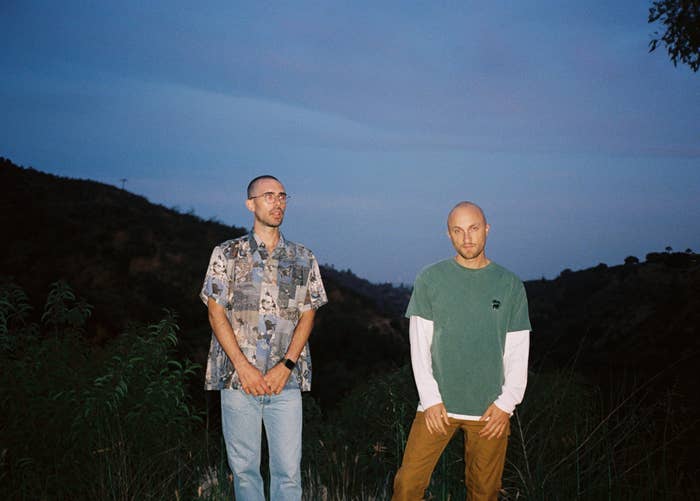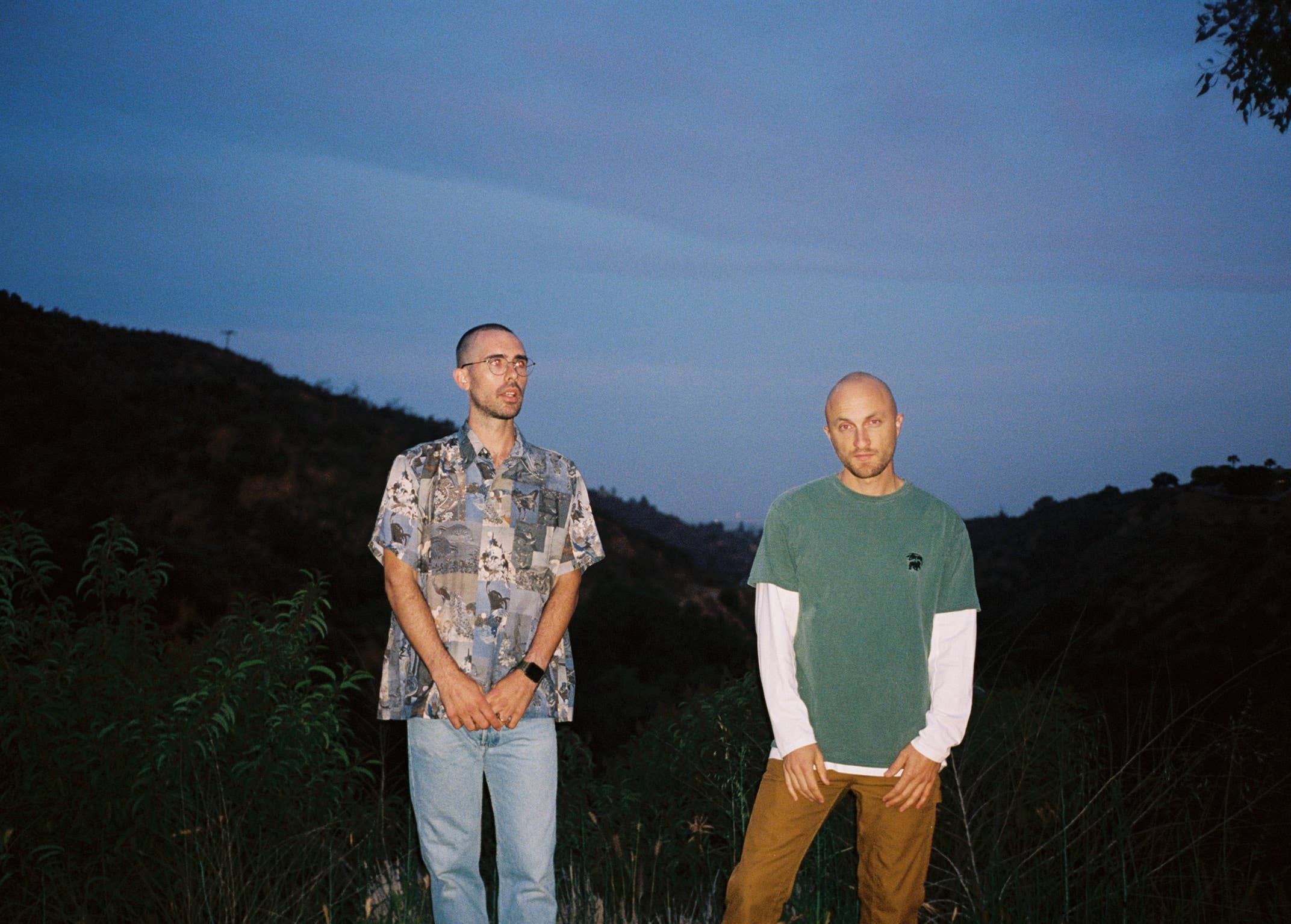
For DJDS, the producer duo formerly known as DJ Dodger Stadium, there are two distinct phases to their music: Before Kanye and After Kanye. Before Kanye, Sam Griesemer (aka Samo Sound Boy) and Jerome Potter (aka Jerome LOL) were making intensely emotional dance music that was aimed at people wearing headphones as much as clubgoers. Their songs, thumping and proudly off-kilter, always centered on samples. The duo loved to find a good, bittersweet phrase from a song you've never heard—something like "lately I've been singing love songs by myself" or "you don't have to be alone" or "I changed my mind"—and repeat it, over and over again, while building a song around it. It was meditative—a technique lifted directly from techno and house music, but more up front about its emotional core. Then someone played one of their songs for Kanye.
In 2016, the pair received an email. What would eventually become The Life of Pablo was underway, and DJDS was recruited to contribute production to the album based off of their 2014 song "One Who Lost" (the repeated phrase for that one is "it looks like I'm the one who lost"). They were sent some music to play with, and would end up spending nearly a month in the studio with Kanye and company as the project was frantically finished. "People from his camp reached out to us and then it all kind of happened in one day—seemed really urgent," Griesemer told The Fader in the wake of the album release. Ultimately, DJDS would end up listed on five of the song credits, for "Ultralight Beam," "Father Stretch My Hands Pt. 1," Freestyle 4," "Low Lights," and "Fade."
The problem—a good one—is that it seems like DJDS can't go back to making the same kind of dance music they used to before Pablo. Big Wave More Fire, the pair's album, which came out last week, is a far cry from the sample-heavy, melodic, four-on-the-floor beats of their previous projects. Instead of crate-digging, they recruited singers; instead of slow builds, they are making genuine, sharply structured pop songs. It sounds like DJDS making their version of a Kanye album, and it's their strongest full-length effort to date.
Complex talked to DJDS about the new album, working with Kanye, and how a secret project with The-Dream may be in the works.
Is that one of you guys singing on on "Bow My Head" and "Caught Alone?"
S: Yeah, that’s me.
Is that the first time you’ve done that on record?
S: Technically we put some of my vocals on some things, like some backgrounds on some stuff we did for one of the Yeezy fashion shows that we worked on the music for.
J: You’re on "Trees."
S: Yeah, some background stuff on "Trees on Fire." It started because we would start on demos and I would sing on the whole thing, then we would show it to the artists we were working with. In most cases, they would make it a lot better and riff off of what I had already done and take it to a whole new place. But the ones that I ended up singing on the record were the ones that couldn't really be done any other way. And, honestly, I tried to get some other people to sing those parts.
J: [Laughs]They wouldn't let it happen. That’s been the entire process as we’ve been working on this for the past few years. There's a whole slew of different parts—what sticks and what feels right, and just how Sam described, some of these start as demos and then you realize that there’s magic in those parts. That’s how we treated all the vocals on the project. We were more interested in the sonics and the feel. That held the most priority for us.
S: I tried to get Vory and Kevin Drew to do a couple of those parts and they wouldn't. They said no, it sounds really hard, you’ve got it already. I took their word for it.
The last two records were mostly based around samples. What made you want to work with actual vocalists this time around?
S: Just evolution, really. We never thought about it that much. But it was the next way to push and challenge ourselves, and get the new sound where we wanted to go. A lot is indebted to how we saw Kanye and those guys work, where it's almost like they’re sampling these different performers. There are so many different features and so many different moments, and they all feel natural and effortless. We took a lot from there, but it’s one of those things where all of those guys come from a sampling background too, we all approach it in the same way as the original material. If someone gives an amazing two bars, you can build from there with other original stuff.
On a couple songs—"Trees on Fire" and "Falling," especially—you have this tendency to looping a phrase over and over again until it fades into the background and becomes its own instrument. You were using these vocalists the same way you've always used samples.
S: It’s cool you picked up on that, I think that’s one of the things that’s ingrained in the way we think about producing. It’s just something we love—we love repetition. When you come from a sampling background, and a dance music background, or a house and techno background, you obviously have to like that. You know the special powers of that kind of stuff. It’s at the root of all of it.
How has the writing process changed? I always imagined you two just finding these samples then chopping them up, and now you’re writing lyrics and working with actual people.
S: Again, I think it’s something we were just kind of looking for. We wanted a new way to push ourselves creatively. We would do a lot of freestyles, essentially, where we would come up with some music and I would get on the mic and start sort of freestyling melodic and lyric ideas, while Jerome would be filling in the production side—adding bits and pieces, filling out the drums, adding more music. A lot of times we would just keep that going for, like, up to 45 minutes, and then stop, go back, and pick the two seconds that really worked, sample ourselves, and build from there. And then when we’d finally get the moments where we’d get other amazing artists coming through the studio and we would always be showing them something and sometimes it was all there, and sometimes we would just have two good lines and have to build almost from scratch.
Some of the songs here feel like they could have more commercial legs than anything on your last two albums. Was that a conscious decision?
S: We just hate the idea of making the same record twice. A lot of our records have a very similar emotion at the core, but we’re trying to change that sonically. We know what the emotion is, but we’re always reaching for the best way to express that. This is just the latest try at that, you know? There’s definitely going to be another couple tries after this [Laughs].
The album feels like your version of a Kanye album.
Both: [Laughs]
I was wondering if you guys thought about it that way at all.
S: No, I mean, you know—we'd be kidding ourselves. He's a huge influence on us, even before we ever got to meet him or work with him. Getting to work on Pablo, that multiplies. His influence is huge on this.
J: Right. If anything, working with him and on that record and understanding that process gave us the tools and perspectives and confidence to go for different sounds or different expressions, and express these feelings in different ways. We would be more bold with the production styles and we learned a lot in the studio about how to push ourselves and do different things. That was definitely a huge influence.
Is there anything on the album that you wouldn't have tried if you hadn't worked with Kanye?
S: I think one of the tracks that feels the most indebted to Kanye is "Pick Me Up." It’s trying to pull off a pretty big and ambitious sound with a lot of different voices, but we had to work on that on a lot to have that energy without losing the emotionality of it. That’s something that Kanye was probably born knowing how to do.
He's been in the headlines a lot lately. Have you been called to work on any of the five projects he’s announced, or gone out to Wyoming?
Both:[Laughs]
S: we can’t talk about that too much. We’re in L.A. right now, if that answers your question at all.
How did you pick vocalists for the project? Who did you sit down and think, "We have to get them on the album," versus people coming in and trying things?
S: It’s a little of both. With somebody like Kelly [Zutrau] from Wet, she’s someone we knew of and were wishing to work with, but other people that ended up being huge parts of this record, we hadn't known much until we started working with them. We started working with someone like Amber Mark, or Vory, two years ago through friends, and they are both such a huge part of this record. They did some of the most amazing stuff on it, and that was built from day one in the studio.
How did you guys link up with The-Dream?
S: Originally from the Pablo sessions. That’s where we met him. We got to spend a good amount of time with him there, and then the Yeezy Season 5 soundtrack was built around a demo he’d done for that song "Bed" that he’d written.
J: The J Holiday song. We produced a song for him, too.
S: Oh yeah, we produced for him [Laughs]. And we’ve been kicking around this idea: he wants to do a project where we do a lot of abstract, out there remixes of his back catalog. Which would be the dream—no pun intended, it would be a dream for us.
J: [Laughs]
S: That little vocal you hear in the beginning, that’s my voice and the original idea. We showed that to Vory.
J: He bodied it.
S: We had this dark, loose-feeling thing, and we thought that we needed something. It had the emotion and looseness, and we needed someone to tie it together.
J: That’s The-Dream’s specialty
S: He was able to do that tight, perfect hook. I think it was exactly what the track needed, just this expert, precision thing. When he kicks in, it’s like "Oh, yeah. This guy has been in the game."
J: I’m just such a big fan of The-Dream, and have been forever. There's this specific feeling he can capture on albums like Love Vs. Money, and I think he brought that to this song and it worked really, really beautifully with Vory’s voice and the tone of the song. It’s a big honor to be working with him.
I don’t think I’ve seen either of you perform since your Body High days. Are you still DJing, or is it a different show now that your production is branching out?
S: We have some ideas for a more built out, ambitious live show when we find some times to work with some of the people that appeared on the album. But right now, we’re trying to make the show a really fun club experience where we can play this stuff and a million other versions and remixes of stuff that we’ve worked on in a club context. We’ve remixed ourselves a bunch for that, and we have a lot of other remixes and edits and versions of things that we’ve never put out, but hold onto for live sets. The hope is it’s a very fun time but you’re hearing versions of songs you’ve never heard before.

